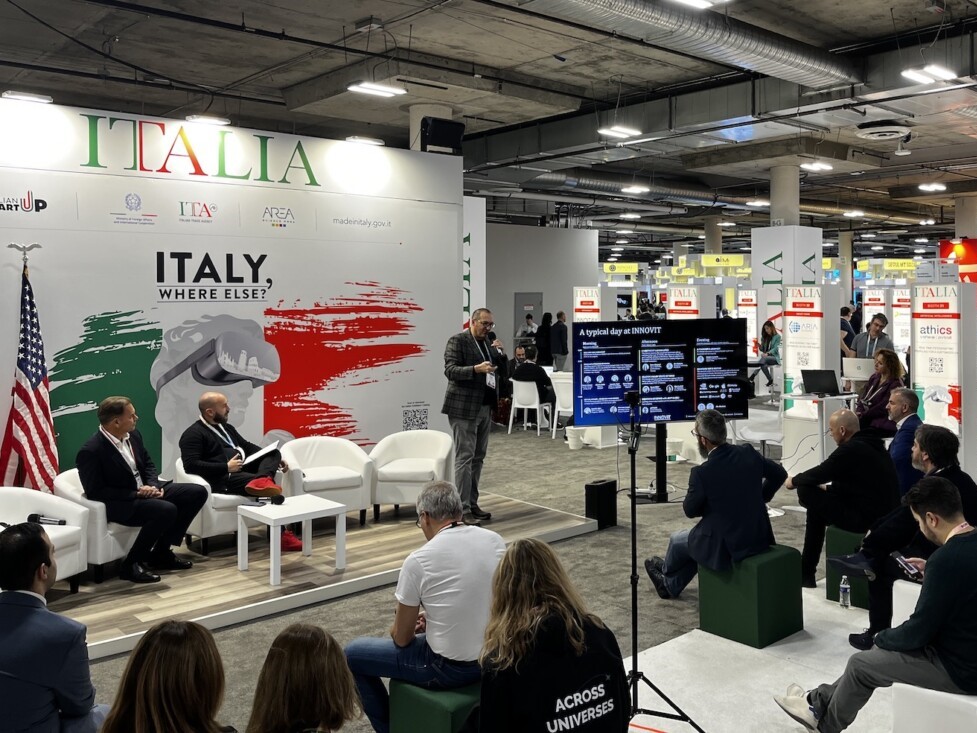
 Alberto Improda
Alberto Improda
Italian design: Italian Innovation and Design at CES in Las Vegas
- WTI Magazine #172 Feb 17, 2024
-

 Alberto Improda
Alberto Improda
The latest edition of CES, the Consumer Electronic Show, the world's most important trade show for the computer and consumer electronics industry, took place in Las Vegas, January 9-12, 2024.
It is an event that has gradually become more prominent, evolving from a mere showcase for the latest and most curious electronic gadgets to a genuine driving moment for all-around innovation.
A large part of this innovation comes from startups, so much so that in the 2024 edition of CES an ad hoc exhibition space, called Eureka Park, was dedicated to them.
Italy had a particularly significant presence in this sector, thanks to a joint initiative of Italian Trade Agency, the Agency for the Promotion Abroad and Internationalization of Italian Companies, and Area Science Park, a national research organization overseen by the Ministry of Universities and Research.
The project of Italian Trade Agency and Area Science Park is aimed at raising awareness in international markets of Italian expertise beyond the fields most traditionally linked to our country, such as Fashion, Food, Automotive and Tourism.
The delegation of our startups consisted of 50 companies, whose exhibition occupied an area of as much as 600 square meters.
Alessandra Rainaldi, director of Italian Trade Agency Los Angeles, with delegation over the entire U.S. territory in the field of Innovation and Technology, in inaugurating the space said with justifiable pride, "We are the third European delegation, after France and the Netherlands."
The exhibition area features the words "Italy, where else?" and a reproduction of Michelangelo's David equipped with augmented reality glasses.
The meaning of this symbolism was well illustrated by Raffaella Valentini, Consul of Los Angeles: "With the talent and creativity of our startups, we show today the most modern and innovative face of our country, which is not only History and tradition, but knows how to look to the future.
Our startups, from thirteen regions, deal with very different activities and offer solutions to make homes, businesses and cities smart and future-proof.
Projects based on automation, advanced sensing and new ways of thinking about mobility were on display, with solutions from air logistics to modular public road transport.
Technologies showcased also resulted in artificial intelligence that diagnoses cancer by calculating probabilities, a surface coating that purifies the air and reduces smog, augmented and virtual reality applications for learning and the study of cultural heritage.
Young Italian companies also presented initiatives regarding web3 and blockchain, supporting in particular agrifood with supply chain tracking, as well as marketing and notary document management.
Finally, there was no shortage of technology proposals pertaining to digital health and supports for motor and digital accessibility, from virtual biopsy of bone architecture to self-driving wheelchairs for airports.
As evidence of the breadth of the functions performed by Design in its most advanced and modern meanings, Design has played a pivotal role in several of these projects, both functionally and aesthetically.
Consider, by way of example, the Hooly project by the Pisan startup Ganiga.
Hoooly is a smart trash can created and patented by the Tuscan company in order to make waste management smarter and more sustainable.
The bin, characterized by an original and futuristic Design, operates with the peculiar use of an Artificial Intelligence developed ad hoc.
Using this technology, the device automatically sorts waste and generates data and statistics from scratch, based on which an optimized collection route can be planned to simultaneously reduce operating costs and pollution.
The information collected by Hoooly can be used to reconstruct users' consumption habits, enabling the delivery of customized advertisements to each user on the special screen of the waste bin.
"We have invented a smart trash can that through artificial intelligence automatically recognizes and sorts waste, alerts when it is full, protects the environment, educates citizens on recycling, and creates timely disposal statistics," said Nicholas Zeoli, CEO & Founder of Ganiga,
Hoooly operates and manages sorting totally autonomously, that is, without the need for human action, which intervenes only at the emptying stage.
The system also includes a connection to the cloud, for full and intelligent interaction with the user: for example, to signal when the bin is full, or to upload usage data or download updates.
In the project, which is the result of truly advanced and holistic Design, nothing has been left to chance: Hoooly is geolocated on an app so that it can be tracked in an easy and timely manner.
The applications of this innovative device can be truly multiple and highly useful, in the name of increasingly careful, effective and sustainable waste management.
Hooly's typical context of use is in transit locations such as shopping centers, malls and airports, but the smart bin also lends itself to deployment in businesses and more generally in contexts frequented by public users.